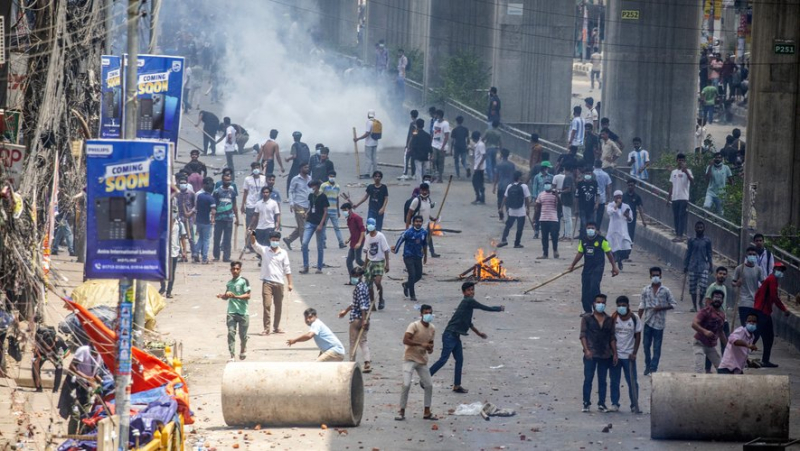More than 120 dead, thousands of demonstrators, police shootings, contested power… what is happening in Bangladesh ?

Des manifestants le 18 juillet 2024. MAXPPP – MONIRUL ALAM
l'essentiel La police antiémeute a tiré samedi à balles réelles sur des manifestants au Bangladesh où l'armée, présente en force, patrouille dans les villes au lendemain d'une nouvelle journée d'affrontements meurtriers.
The movement launched by student demonstrations and which left at least 133 dead this week, according to a count carried out by AFP based on data from police and hospital sources, prompted Prime Minister Sheikh Hasina, in power for 15 years, to postpone trips abroad.
"Anarchy in the country"
"She canceled her visits to Spain and Brazil due to the current situation", explained Saturday to AFP its spokesperson Nayeemul Islam Khan. The demonstrators denounce hiring quotas in the civil service which they believe benefit the power in place and are now demanding the resignation of Sheikh Hasina.
Crisscrossed by soldiers traveling on foot or in armored vehicles, the arteries of the capital Dhaka, a megalopolis of 20 million inhabitants, were deserted on Saturday morning. But thousands of people subsequently returned to the streets of the Rampura district and the police fired on them, injuring at least one, AFP noted.
The crowd was protesting against the curfew which came into force at midnight and which must last at least until 10 a.m. Sunday (04:00 GMT) throughout Bangladesh. "There is anarchy in the country. People are being shot like rabbits", one of them, Nazrul Islam, 52, told AFP.
Bulled to death
Hospitals, for their part, have reported to AFP a growing number of people killed by gunshots since Thursday, with police shootings being the cause of more than half. deaths recorded since the start of the week, according to descriptions provided by medical staff.
"The army has been deployed throughout the country to ensure the maintenance of public order", armed forces spokesperson Shahdat Hossain told AFP. The head of government's office had taken a decision to this effect the day before, the police having once again failed to control the situation.
"Hundreds of thousands of people" confronted the police in Dhaka on Friday, according to their spokesperson, Faruk Hossain. "At least 150 police officers were admitted to the hospital. One hundred and fifty others received first aid", he told AFP, adding that two of them had been beaten to death. "Protesters set fire to many police booths" and "many government offices were burned and vandalized" ;, Mr. Hossain further affirmed.
AFP learned from Dhaka Medical College Hospital that two police officers died on Saturday, while four other people admitted to intensive care succumbed to their injuries. A representative of Students Against Discrimination, the main group organizing the protests, told AFP that two of its leaders had been arrested since Friday.
The authorities also imposed a national internet shutdown on Thursday, severely hampering communications. Government websites remain inaccessible and major newspapers, including the Dhaka Tribune and the Daily Star, have been unable to update their social media accounts.
Bangladesh Television, the state broadcaster, also remains unable to continue broadcasting after its headquarters in Dhaka was burned down by protesters that day.
Sheikh Hasina's power challenged
The demonstrations, almost daily since the beginning of July, aim to obtain an end to hiring quotas in the public service which allow more than half of positions to be reserved for specific groups, notably to the sons and daughters of veterans of the Bangladesh Liberation War against Pakistan in 1971.
Many assure that the program benefits children from circles supporting Ms. Hasina, 76, who has led her country since 2009 and won her fourth consecutive election in January after a vote largely predicted. Her government is accused by the human rights defenders to abuse state institutions to establish their influence and eradicate dissent, in particular through the extrajudicial assassination of opponents.
UN High Commissioner for Human Rights Volker Türk condemned the repression on Friday, calling it attacks "particularly shocking and unacceptable". "Frustration is mounting in Bangladesh because the country has not had a truly competitive national election in more than 15 years", observed to AFP Pierre Prakash, of the International Crisis Group.
"With no real alternative at the ballot box, disgruntled Bangladeshis have few options other than street protests to make hear their voice", he judged. "The increase in the number of deaths is shocking proof of the absolute intolerance shown by the Bangladeshi authorities towards the protest actions and dissent", commented Babu Ram Pant of Amnesty International.




